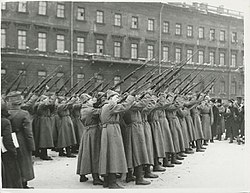As World War I raged on, the Red Army was embroiled in the Russian Civil War, a tumultuous conflict that lasted from 1918 to 1922. The Red Army’s ideology and determination fueled their fight against counter-revolutionary forces, both internal and external. This struggle solidified their reputation as a disciplined and fervent fighting force.
The Red Army’s military strategies were characterized by innovation and adaptability. One of their notable successes was the introduction of “deep battle” tactics, emphasizing mobility and coordination between infantry, artillery, and armored units. These tactics laid the groundwork for modern combined arms warfare.
With the onset of World War II, the Red Army faced its greatest challenge. The invasion of the Soviet Union by Nazi Germany tested their resilience. The Red Army’s tenacity during the Battle of Stalingrad marked a pivotal moment, leading to the eventual defeat of the German forces on the Eastern Front. This victory shifted the momentum of the war and was a crucial factor in Germany’s ultimate defeat.
After the war, the Red Army’s influence extended beyond military affairs. It played a pivotal role in the spread of communism, contributing to the establishment of Soviet-aligned regimes in Eastern Europe. However, the Cold War rivalry between the United States and the Soviet Union led to increased tensions, and the Red Army became a symbol of the ideological struggle between capitalism and communism.
The legacy of the Red Army continues to reverberate today. Its role in shaping the course of history cannot be understated. From its origins in the Russian Revolution to its pivotal role in defeating Nazi Germany, the Red Army left an indelible mark on the 20th century. Its strategies and tactics continue to influence modern military thinking, and its historical significance remains a subject of study and debate.
In conclusion, the Qızıl Ordu, or Red Army, stands as a testament to the power of ideology, determination, and innovation in the realm of warfare. Its impact on history, from the Russian Revolution to World War II and beyond, is a reminder of the complex interplay between military forces and global events. The legacy of the Red Army serves as a valuable lesson in the enduring effects of strategic thinking and unwavering commitment.



















Add Comment